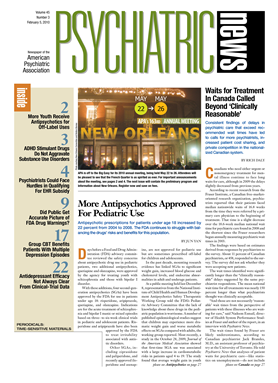Canada may have universal health insurance, but that does not necessarily level the playing field for people with serious mental illness, a new study shows.
The study was headed by Steve Kisely, M.D., director of the Queensland Center for Health Data at the University of Queensland in Australia and an adjunct professor of psychiatry at Dalhousie University in Nova Scotia, Canada. Results were published in the December 2009 British Journal of Psychiatry.
The study included some 65,000 people admitted to hospitals in Nova Scotia because of heart disease or stroke. Of the approximately 49,000 admitted because of heart disease, about 1,300 (3 percent) had a history of psychosis. Out of the 16,000 or so admitted because of stroke, about 600 (4 percent) had a history of psychosis.
Kisely and his colleagues then examined medical care and outcome data for the subjects to see whether, even with the availability of universal health insurance, those who had a history of psychosis received the same level of care as those without such a history and whether the outcomes of the two groups were comparable.
It turned out that neither the level of care nor the outcomes were in fact comparable. Subjects with a history of psychosis received significantly fewer procedures and medications known to counter heart disease or stroke than did subjects without such a history. They were also significantly more likely to die within a year after hospitalization than the latter were. These results held even when some possibly confounding variables such as age, gender, socioeconomic status, comorbidity, and place of residence were considered.
“Our results suggest that people with psychosis admitted for circulatory disease experience similar disadvantages under universal health care to those in the U.S.A.,” Kisely and his colleagues concluded. “They have the highest mortality, but the least chance of receiving many specialized interventions or circulatory medications.”
But why? There are several possible explanations, Kisely and his group noted.
While Canadians with psychosis have universal health insurance, they may still have trouble navigating the health care system and receiving appropriate treatments for vascular problems because of their cognitive, communication, or behavioral difficulties.
Additionally, medical specialists may settle in more affluent areas, thus reducing the access of some of those with psychosis to specialized cardiovascular procedures. Still, even people with psychosis who live in rural areas should have access, via their family doctors, to medications that can counter heart disease or stroke.
Physicians may be reluctant to offer cardiovascular surgical interventions to patients with psychosis out of concern that the latter may be at heightened risk of complications from such interventions.
And then, of course, there is the possibility that physicians in general medical settings do not want to deal with patients who have a history of psychosis. Kisely favors this explanation, he told Psychiatric News.
In any event, the results have implications for American psychiatrists, especially as the United States may be on the brink of moving to some version of universal health insurance, Kisely believes.
“Data from the United States indicate that VA hospitals are the settings where there is the least difference between care of patients with psychosis and care of patients without psychosis. In other words, the VA hospital system most resembles care in countries such as Canada. Providers are salaried employees, out-of-pocket costs for patients are low, and coverage or eligibility is not tied to employment.”
The study was funded by the Heart and Stroke Foundation of Nova Scotia.
